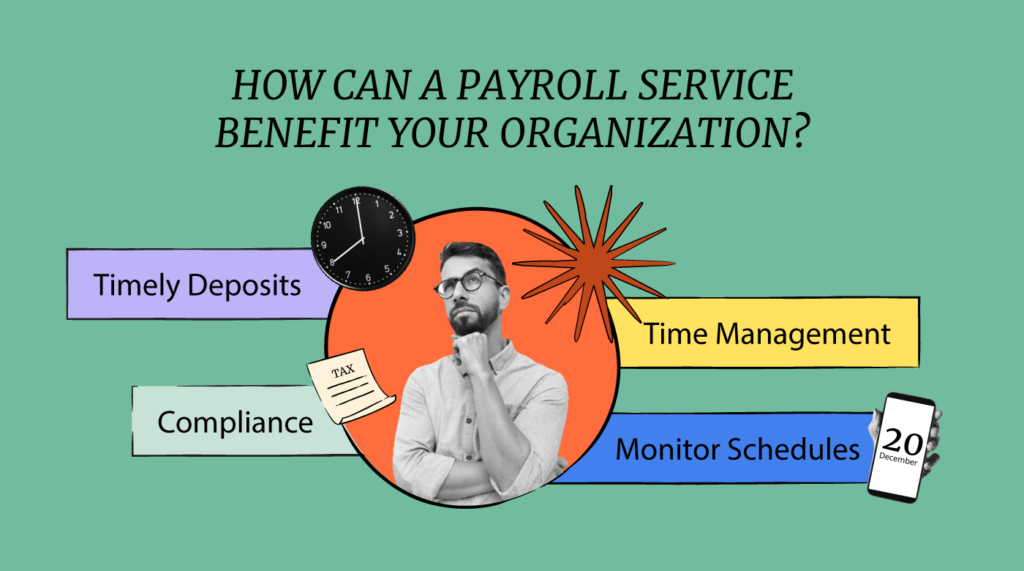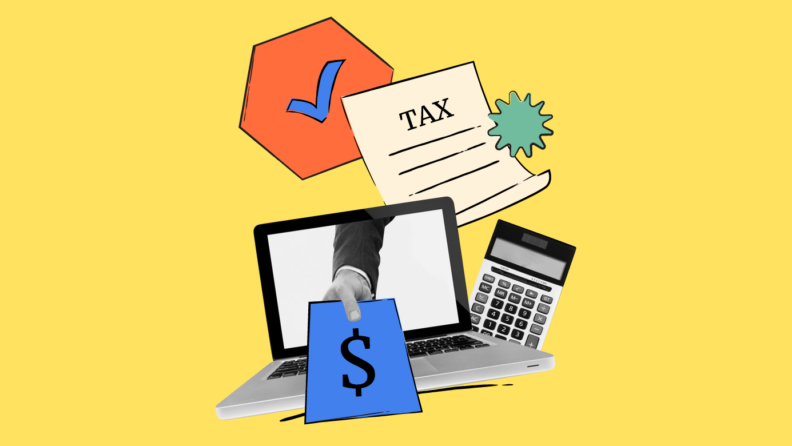If you've ever had a compliance headache or errors to fix with in your payroll function, you've probably thought about outsourcing payroll to a service provider who assumes responsibility for these things.
In this article, I’ll answer the question, “What is a payroll service?” and share how to find the best partner to suit your organization’s payroll needs.
What is a Payroll Service?
Payroll services are third party providers that take over payroll functions on your behalf. Working with a payroll service provider allows companies to outsource payroll processing.
This can be an enormous help for small businesses who have reached that awkward stage in their growth where they have too many employees for one person to manage payroll on their own, but don’t yet have a formal in-house payroll department.
Payroll services can handle a range of tasks, including specialized payroll solutions for small businesses, ensuring compliance and efficiency.
- Tax filing with the IRS, CRA, or local governing body
- Tax payment
- Worker’s compensation
- Employee benefits planning
- Bookkeeping
- Employment tax forms
- Running payroll reports
- Year-end payroll reporting
- Employee attendance and time
- Direct deposits (bi-weekly payroll or however your company chooses)
- Additional human resources functions
Types of Payroll Service Providers
Payroll service providers, including PEO companies, cater to a wide variety of needs. Some specialize in small businesses while others focus on enterprise. Some are primarily payroll companies, while others also have bookkeepers and accountants on staff.
Generally speaking, we can divide providers into two main categories:
Full-Service Payroll Providers
As the name suggests, full-service payroll providers (PSPs) handle payroll processing from start to finish. You provide essential business and employee details, and they take care of calculating wages, tax deductions, compliance, and direct deposits. Many full-service providers also offer HR support, benefits administration, and tax filing to ease the burden of managing payroll in-house.
DIY Payroll Providers
With a DIY payroll provider, you’re required to perform some of the administrative tasks and the provider conducts the additional tasks of your choosing.
With a DIY payroll provider, you retain more control over certain payroll tasks while outsourcing only the specific services you need.
Example: You may choose to track employee hours and attendance internally, while the provider manages paycheck distribution, payroll calculations and tax deductions, and paycheck distribution. This option requires more administrative involvement but can be more budget-friendly for businesses comfortable handling some payroll processes in-house.
One of the biggest factors in choosing between full-service and DIY payroll providers is cost. A full-service approach comes with a higher price tag but reduces administrative workload and compliance risks. Meanwhile, a DIY payroll model is often more affordable but requires internal payroll expertise to avoid errors.
How Do Payroll Services Work?
At the heart of payroll services is the automation of payroll processing, which includes calculating employee wages, withholding taxes, and ensuring compliance with various labor laws.
When a company uses payroll services, they begin by inputting employee information into the system. This data includes details such as hours worked, pay rates, tax withholding preferences from a W4 form, and any additional deductions or benefits they opt into.
Once the employee data is entered, the payroll service automatically calculates gross pay, deductions, social security, Medicare, and any other relevant contributions.
An essential feature of payroll services is their ability to ensure that the correct amount of taxes is withheld from each paycheck and that these funds are deposited with the appropriate government agencies. This includes federal, state, and local taxes, as well as any required unemployment insurance contributions.
Payroll services also generate important reports and records for both employers and employees. These reports include pay stubs, tax forms such as W-2s or 1099s, and summaries of all payroll activities.
How Much Do Payroll Services Cost?
The cost of payroll solutions can vary widely depending on the size of your business, the complexity of your payroll needs, and the specific features you require. Here's a quick overview of the typical costs associated with payroll services:
Pricing Models
| Pricing Model | Description | Average Cost |
|---|---|---|
| Per Employee Per Month | Charges based on the number of employees processed monthly | $4 - $12 per employee/month |
| Flat Monthly Fee | Fixed rate regardless of the number of employees | $20 - $150 per month |
| Per Payroll Run | Charges each time payroll is processed | $25 - $200 per payroll run |
Additional Costs
| Service | Description | Additional Cost |
|---|---|---|
| Setup Fees | Initial setup and configuration | $50 - $200 one-time |
| Year-End Tax Forms | Preparation and distribution of W-2s and 1099s | $4 - $10 per form |
| Direct Deposit Fees | Charges for enabling direct deposit for employees | $1.50 - $5 per employee/month |
| Tax Filing Services | Handling federal, state, and local tax filings | Included or $10 - $25 per filing |
| HR Integration | Integration with HR software for additional features | $50 - $150 per month |
Example Cost Scenarios
| Business Size | Monthly Payroll Runs | Employees | Estimated Monthly Cost |
|---|---|---|---|
| Small Business | 2 | 10 | $60 - $140 |
| Medium Business | 2 | 50 | $300 - $600 |
| Large Business | 4 | 200 | $1,000 - $2,500 |
Factors Affecting Cost
- Number of Employees: More employees generally increase the cost.
- Frequency of Payroll Runs: More frequent payroll processing leads to higher costs.
- Additional Features: Services like direct deposit, payroll tax filing, and HR integration can add to the overall cost.
- Customization Needs: Tailored solutions may incur extra charges.
- Location of employees: Distributed workforces may increase the cost due to a higher number of regulations and laws that increase the compliance burden.
How Can a Payroll Service Benefit Your Organization?
If you’ve conducted all your payroll tasks in-house up until now, you may be wondering why you need a payroll service provider. Let’s take a look at a few of the pros of outsourcing your payroll.

1. Timely Deposits
Outsourcing payroll mitigates errors and ensures that employees are paid on time, every time.
If you’re dealing with hourly and salary, full-time and part-time employees, payroll for independent contractors, and multiple schedules, rates, and pay periods, payroll can quickly become complicated and confusing.
2. Compliance
Payroll service providers will calculate and deduct employment tax from every paycheck. Not only does this take the time-consuming task of tax compliance off your hands, it also ensures that your employees aren’t confronted with any unexpected income tax bills at year end.
The complexity in payroll isn’t the calculation, it’s the compliance. If your data isn’t clean, it doesn’t matter how expensive the system is.
Payroll services often handle tax compliance for you, covering data synchronization and security measures. But if you're looking for more control over this aspect, consider using advanced payroll software that offers detailed tax filing features.
3. Time Management
Often within small businesses, the payroll function falls to the human resources team.
Once you outsource to an online payroll service company, you can offload a variety of tasks, consolidate others into a central software application, and dramatically simplify the process of payroll overall. This way, more time can be spent on the tasks that pertain directly to your job description.
While you may be able to easily handle doing payroll for one employee, as you grow as a company you may consider outsourcing the best method for payroll management.
4. Monitor Schedules
The majority of payroll service companies offer self-service options that allow employees to directly input hours and submit paid time-off (PTO) requests.
In placing the responsibility for reporting in the hands of the employees, you eliminate bottlenecks and increase the accuracy of time management records. With scheduling data now in a central location, it’s easy for you to monitor hours and track attendance.
What is the Difference Between Payroll Service and Payroll Software?
Working with a payroll service provider allows you to outsource your payroll to a third party, freeing up your time to focus on other tasks.
Payroll software is typically more budget-friendly than hiring a payroll service, but it can be tricky to manage without an accounting background.
Using HR payroll software means you will still have to execute payroll functions yourself, but with the assistance of a software tool. You may have to manually input payroll data like insurance premiums, retirement plan deductions, social security, and other wage garnishments.
Small business owners will still find payroll software to be helpful, since the software will calculate payments and generate checks on your behalf. But working with software alone will not free up the time and energy that a payroll service provider can.
A payroll service takes payroll off your plate, allowing time for other business priorities. On the other hand, payroll software puts you in control, requiring manual input and calculations but offering greater oversight of the process.
For more, take a read of our article payroll software vs payroll services.
How to Choose the Best Payroll Service
Choosing a payroll service provider can be a challenge. There are a variety of factors to consider as you weigh up your options. Here are some things to keep in mind. The best choice depends on your business size, budget, and payroll complexity. Need full HR and compliance support? A PEO might be the right fit. Prefer to keep HR in-house while outsourcing payroll processing? A PSP could be ideal.
Questions to ask when choosing payroll service
- What’s your budget?
- How many employees do you have?
- What additional services (on top of payroll) would you like to see?
- Consider your existing technology stack. What are the essential integrations for your payroll?
- How much customer support do you need, such as a dedicated customer success manager?
Characteristics and assets
- A simple user interface that’s easy to navigate
- Training materials to simplify onboarding for new hires
- Integrations with other relevant tools your team is currently using
- Cost effective solutions with excellent value for the money
Key features
- Direct deposit payments
- Payroll scheduling
- Self-service portal
- Tax compliance
- Tax filing
- Payroll reporting
Need expert help selecting the right Payroll Management Software?
If you’re struggling to choose the right software, let us help you. Just share your needs in the form below and you’ll get free access to our dedicated software advisors who match and connect you with the best vendors for your needs.
Find the Right Partner Today
Working with a payroll partner or PEO can help scale your small business by streamlining your payroll process and freeing up valuable time.
If you’re looking for the right partner to suit your organization’s needs, check out these super handy lists:
- Best Payroll Companies to Modernize Your Payroll Processes
- How Global HR Services Can Support International Teams
You can also read our guide to HR outsourcing to help you discover what other HR functions might benefit from being outsourced.
To stay informed about all the latest human resources trends and insights, don’t forget to subscribe to our newsletter.




